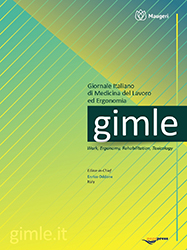Motoneuron diseases: impact on health professionals
All claims expressed in this article are solely those of the authors and do not necessarily represent those of their affiliated organizations, or those of the publisher, the editors and the reviewers. Any product that may be evaluated in this article or claim that may be made by its manufacturer is not guaranteed or endorsed by the publisher.
Authors
The approach to patients affected by motor neuron disease (MND) and their caregivers requires specific training for the care-team. In fact, the progression of the disease, with the decline of physical - and sometimes cognitive - function, the increasing difficulties in speaking, breathing, and swallowing and the need of invasive choices, as the artificial nutrition and tracheostomy, constitute a challenge for the health professionals, often generating distress. For this reason, their cohesion and sharing abilities are fundamental. Psychologist assumes a strategic role in supporting and facilitating the analysis of clinical cases and of the team's intra/interpersonal dynamics. For this aim, he/she needs specific training and instruments. We here present a semi-structured interview - the Motor Neuron Disease-Psychological Interview (MoNeDi-Pl)which may guide in the psychological assessment of patients affected by MNDs and their caregivers. It can also be a handy reference tool for other members of the healthcare team providing necessary information about the patient and caregiver in order to optimize clinical decision making about which health interventions to apply.
How to Cite

This work is licensed under a Creative Commons Attribution-NonCommercial 4.0 International License.
PAGEPress has chosen to apply the Creative Commons Attribution NonCommercial 4.0 International License (CC BY-NC 4.0) to all manuscripts to be published.






